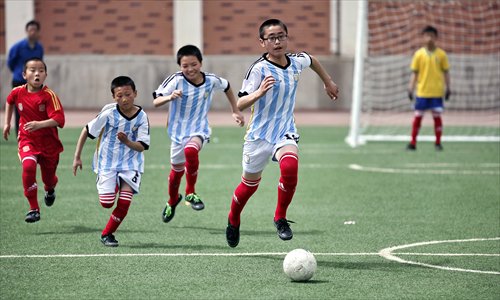Cabinet issues guideline to boost sports industry
Private capital encouraged to participate in sector

Primary school students in Pingliang, Northwest China's Gansu Province, play football. Photo: CFP

The State Council, China's cabinet, announced Monday a guideline to boost the country's sports sector, hoping the sector can become an important driving force for the country's economic growth.
It is the first time for several ministries to work together for the release of a guideline by the cabinet for the sports sector, which might make the move more effective than previous supporting policies, analysts said.
The government expects the scale of the sports industry to reach 5 trillion yuan ($815 billion) by the end of 2025.
The central government will adopt various measures to support the sector, including introduction of private capital into the sports sector via listing or bond issuance by qualified enterprises, said the guideline.
To lower the operational cost for sports enterprises, the government will also lower enterprises' income tax rate to 15 percent from a general standard of around 25 percent.
Concerning one of the major targets of the guideline, the State Council announced it will take measures to promote popularization of three types of ball sport - soccer, basketball and volleyball. For instance, it will set up long-term development plan for soccer, which is relatively undeveloped compared with other ball sports in China, such as construction for sport facilities and promotion of soccer on campuses.
Private capital is also encouraged to join in the construction of ice and snow sport sites.
Wei Deguang, chairman and president of the I Sweep Clurling Club in Beijing's Huairou district, told the Global Times on Monday that the guideline is "good news" for China's ice and snow sports industry.
Curling is thought to have been invented in medieval Scotland. But outside of Scotland and Canada where it is extremely popular, few in the US and Europe and even fewer people in China follow or play it.
Wei said that the high financial cost is one of the major barriers to its popularity. Each curling stone must be imported from Scotland and costs much more than 10,000 yuan ($1,633), and a curling ice sheet is made of purified water mixed with milk and red wine, said Wei.
Wei thinks drawing private capital into ice and snow sports will be helpful to popularize the sport.
Beijing has launched a bid to host the 2022 Winter Olympic Games. The Kazakh city Almaty is the other candidate to host the games.
To encourage more residents to join in sports, the State Council also required local governments to incorporate public expenditure on sports into their fiscal budgetary outlays.
In addition to the financial support by the governments, the cabinet also announced measures to change the current operation mechanism of sports industry in China.
For instance, it encouraged professionalizing sports events including setting up professional sports leagues, improving corporate governance structure of sports clubs, as well as establishment of modern enterprise system in this sector.
To protect the sports enterprises' business interests, the guideline noted the need to protect their intellectual property rights. Enterprises are also encouraged to increase gains from sponsorships and advertisements.
Since China's sports industry is still in its "infant stage," the enterprises' intellectual property rights "are not well protected," He Wenyi, executive director of the China Institute for Sports Value under the Peking University, told the Global Times Monday.
He participated in the discussions about the guideline in March this year.
Sports in China "is not as commercialized as in some Western countries," and the sports activities are always considered as the responsibility of the State, which means most of the sports resources including the staging and organizing rights are held by the State, and few private companies can get involved, according to He.
He believes that the new guideline will be more effective than previous policies as they involve more ministries, and will enhance the sports industry's role in the economy.
Wei of I Sweep Clurling Club also pointed out that the official institutional model for sports is likely to see changes, as the guideline, if strictly executed, will help advance the idea of sports being played also for fun and health, and not just for medals in competitions.
Currently the Chinese sports model is a strictly controlled pyramid with all athletes picked young and trained year-round for specific sports. It is a model far different from the Western and other countries where athletes develop and compete privately in local sports clubs, schools, and through their parents' encouragement and support.